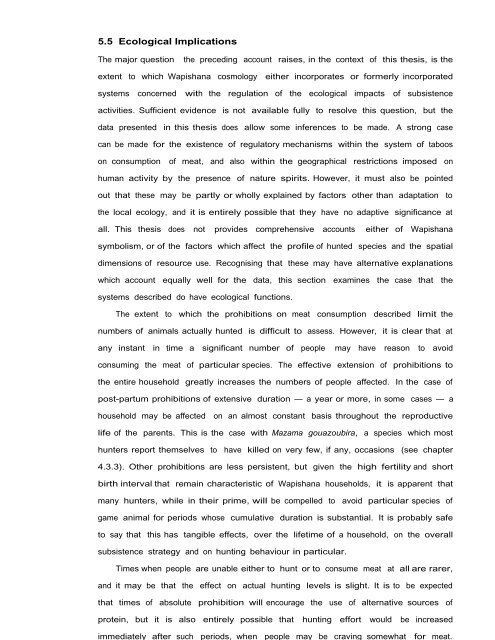Ethnoecology, Resource Use, Conservation And Development In A ...
Ethnoecology, Resource Use, Conservation And Development In A ...
Ethnoecology, Resource Use, Conservation And Development In A ...
You also want an ePaper? Increase the reach of your titles
YUMPU automatically turns print PDFs into web optimized ePapers that Google loves.
5.5 Ecological Implications<br />
The major question the preceding account raises, in the context of this thesis, is the<br />
extent to which Wapishana cosmology either incorporates or formerly incorporated<br />
systems concerned with the regulation of the ecological impacts of subsistence<br />
activities. Sufficient evidence is not available fully to resolve this question, but the<br />
data presented in this thesis does allow some inferences to be made. A strong case<br />
can be made for the existence of regulatory mechanisms within the system of taboos<br />
on consumption of meat, and also within the geographical restrictions imposed on<br />
human activity by the presence of nature spirits. However, it must also be pointed<br />
out that these may be partly or wholly explained by factors other than adaptation to<br />
the local ecology, and it is entirely possible that they have no adaptive significance at<br />
all. This thesis does not provides comprehensive accounts either of Wapishana<br />
symbolism, or of the factors which affect the profile of hunted species and the spatial<br />
dimensions of resource use. Recognising that these may have alternative explanations<br />
which account equally well for the data, this section examines the case that the<br />
systems described do have ecological functions.<br />
The extent to which the prohibitions on meat consumption described limit the<br />
numbers of animals actually hunted is difficult to assess. However, it is clear that at<br />
any instant in time a significant number of people may have reason to avoid<br />
consuming the meat of particular species. The effective extension of prohibitions to<br />
the entire household greatly increases the numbers of people affected. <strong>In</strong> the case of<br />
post-partum prohibitions of extensive duration — a year or more, in some cases — a<br />
household may be affected on an almost constant basis throughout the reproductive<br />
life of the parents. This is the case with Mazama gouazoubira, a species which most<br />
hunters report themselves to have killed on very few, if any, occasions (see chapter<br />
4.3.3). Other prohibitions are less persistent, but given the high fertility and short<br />
birth interval that remain characteristic of Wapishana households, it is apparent that<br />
many hunters, while in their prime, will be compelled to avoid particular species of<br />
game animal for periods whose cumulative duration is substantial. It is probably safe<br />
to say that this has tangible effects, over the lifetime of a household, on the overall<br />
subsistence strategy and on hunting behaviour in particular.<br />
Times when people are unable either to hunt or to consume meat at all are rarer,<br />
and it may be that the effect on actual hunting levels is slight. It is to be expected<br />
that times of absolute prohibition will encourage the use of alternative sources of<br />
protein, but it is also entirely possible that hunting effort would be increased<br />
immediately after such periods, when people may be craving somewhat for meat.


